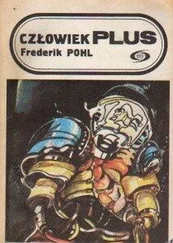When all that was done, the prosthetic and surgical teams began doing things that had never been done to any human being before. His entire nervous system was revised and all the major pathways connected with coupling devices that led to the big computer downstairs. That was an all-purpose IBM 3070. It took up half a room and still did not have enough capacity to do all the jobs demanded of it. It was only an interim hookup. Two thousand miles away, in upstate New York, the IBM factory was putting together a special-purpose computer that would fit into a backpack. Designing that was the most difficult part of the project; we kept revising the circuits even while they were being fitted together on the workbenches. It could not weigh more than eighty pounds, Earth weight. Its greatest dimension could not be more than nineteen inches. And it had to work from DC batteries which were kept continually recharged by solar panels.
The solar panels were a problem at first, but we solved that one rather elegantly. They required an absolute minimum surface area of nearly thirty square feet. The surface area of Roger’s body, even after it had been revised with various attachments, wasn’t large enough, wouldn’t have been even if all of it could have been accepting Mars’s fairly feeble sunlight at once. The way we solved the problem was to design two great gossamer fairy wings. “He’s going to look like Oberon,” Brad said gleefully when he saw the drawings. “Or like a bat,” grumbled Kathleen Doughty.
They did resemble bat wings, especially as they were jet-black. They would be no good for flying, even in a decently thick atmosphere if Mars had had one. They were thin film, with little structural strength. But they weren’t meant for flying or for any kind of load-bearing. They were only meant to preen themselves out automatically, oriented to accept as much radiation as the sun could provide. As an afterthought, the design was changed to include a certain amount of control on Roger’s part so he could use the wings as a tightrope walker uses his pole, to balance. All in all, they were an immense improvement over the “ears” we had put on Willy Hartnett.
The solar wings were designed and fabricated in eight days; by the time Roger’s shoulders were ready to accept them, they were ready to attach. The skin was almost a stock item by now. So much had been used on Willy Hartnett, both as original equipment and as replacements for damage or for design changes as the project went along, that new grafts were loomed to Roger’s shape as rapidly as the surgeons flayed away the integument he was born with.
From time to time he would rouse himself and look at his surroundings with what seemed recognition and intelligence. It was hard to be sure. His visitors — he had a constant stream of them — sometimes spoke to him, sometimes came to regard him as a laboratory specimen to be discussed and manipulated with no more person-to-person concern than they would give a titration flask. Vern Scanyon was in almost every day, staring at the developing creation with growing repugnance. “He looks like hell,” he grumbled. “The taxpayers would love this!”
“Watch it, General,” snarled Kathleen Doughty, interposing her huge body between the director and the subject. “How do you know he can’t hear you?”
Scanyon shrugged and left to report to the President’s office. Don Kayman came in as he was going. “Thanks, mother to all the world,” he said gravely. “I appreciate your concern for my friend Roger.”
“Yeah,” she said irritably. “It’s not sentiment. The poor sod’s got to have some self-confidence; he’s going to need it. You know how many amputees and paraplegics I’ve worked with? And do you know how many of them were certified basket cases that would never walk or move any muscle or even go to the toilet by themselves? It’s will power that does it, Don, and for that you need to believe in yourself.”
Kayman frowned; Roger’s state of mind was still very much in his thoughts. “Are you arguing with me?” Kathleen said sharply, misreading the frown.
“Not in the least! I mean — be reasonable, Kathleen; am I the man to question the transcendence of the spiritual over the physical? I’m just grateful. You’re a good person, Kathleen.”
“Oh, crap,” she grumbled around the cigarette in her mouth. “That’s what they pay me for. And besides,” she said, “I take it you haven’t been in your office yet today? There’s a buck-up note for all of us from His Starship the General, so we won’t forget how important what we’re doing is… and a little hint that if we blow our launch date we’re for the concentration camps.”
“As if we needed reminding,” sighed Father Kayman, looking at Roger’s grotesque and unmoving figure. “Scanyon’s a good man, but he tends to think whatever he does is at the very center of the universe. Only this time he might be right…”
It was at least a colorable claim. To us, there was not much question about it: the most important link in all the complex interrelationships of mind and matter that an earlier generation of scientists had called Gaia was right there, floating on its fluidized bed, looking like the star of a Japanese horror flick. Without Roger Torraway, the Mars launch could not take off on time. Billions of people might question the importance of that. We did not.
There was Roger at the hub of everything. Around him, in the bulk of the project building, there were all the ancillary and associated efforts that were going into making him what he had to be. In the surgery room next door Freeling, Weidner and Bradley tinkered new parts into him. Down in the Mars-normal tank where Willy Hartnett had died, those parts were bench-tested in the Martian environment to failure. Sometimes failure time was appallingly short; then they were redesigned if possible, or backed up — or sometimes used anyway, with crossed fingers and prayers.
The universe expanded away from Roger, like the shells of an onion. Still farther in the building was the giant 3070, clicking and whirring as it accreted new segments of programming to match the mediation facilities being built into Roger hour by hour. Outside the building was the community of Tonka, which lived or died by the health of the project, its principal employer and major reason for being. All around Tonka was the rest of Oklahoma, and spreading out in all directions the other fifty-four states, and around them the troubled, angry world that was busy snapping arrogant notes from one of its capitals to another on the policy level, and clawing for subsistence in each of its myriad personal lives.
The project people had come to close themselves off from most of that world. They didn’t watch the television news when they could avoid it, preferred not to read anything but the sports sections of the newspapers. In high gear, they did not have a great deal of time, but that wasn’t the reason. The reason was that they simply did not want to know. The world was going mad, and the isolated strangeness in the great white cube of the project building seemed sane and real to them, while the rioting in New York, the tac-nuke fighting around the Arabian Gulf and the mass starvation in what used to be called the “emerging nations” seemed irrelevant fantasy.
They were fantasy. At least, they did not matter to the future of our race.
And so Roger continued to change and survive. Kayman spent more and more time with him, every minute he could spare from supervising the Mars-normal tank. He watched with affection as Kathleen Doughty stumped around the room, dropping cigarette ashes on everything but Roger. But he was still troubled.
He had to accept Roger’s need for mediation circuits to interpret the excess of inputs, but he had no answer for the great question: If Roger could not know what he was seeing, how could he see Truth?
Читать дальше












